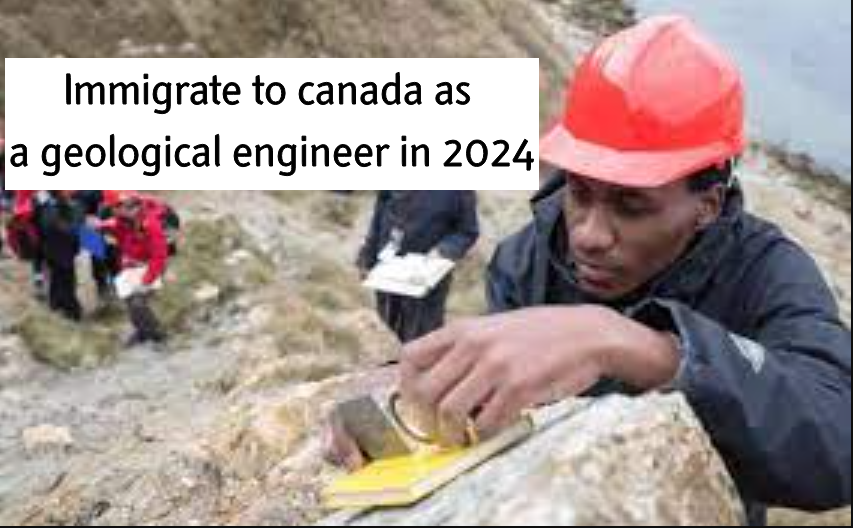immigrate to canada as a geological engineer in 2024

Immigrate to Canada as a Geological Engineer in 2024
Are you a geological engineer who wants to live and work in Canada? If so, you may have a great opportunity to immigrate to Canada under one of the many immigration programs available for skilled workers. In this article, we will explain why Canada needs geological engineers, what qualifications and requirements you need to apply, and how to choose the best immigration pathway for your situation.
Why Canada Needs Geological Engineers
Geological engineers are professionals who apply engineering principles and techniques to study and solve problems related to earth materials, natural resources, geohazards, and environmental issues. They may work in various sectors such as mining, oil and gas, construction, hydrology, geothermal energy, and environmental consulting.
Canada is a country with abundant natural resources and diverse geological features. It also faces challenges such as climate change, natural disasters, land use planning, and resource management. Therefore, Canada needs qualified geological engineers who can contribute to the exploration, development, protection, and sustainability of its natural assets.
According to the Government of Canada’s Job Bank website, the demand for geological engineers is expected to grow moderately in most regions of Canada until 2026. The median annual salary for geological engineers was $92,000 in 2020. Moreover, geological engineers are eligible to apply for immigration under the National Occupation Code (NOC) list, which means they are considered as skilled workers who can fill labour shortages in Canada.
Qualifications Required to Immigrate to Canada as a Geological Engineer
To immigrate to Canada as a geological engineer, you need to meet certain qualifications and requirements depending on the immigration program you choose. However, some common criteria include:
- A bachelor’s degree in geological engineering or a related discipline from a recognized institution. A master’s degree or doctorate may be required for some positions or programs.
- At least one year of relevant work experience in your field. Some programs may require more experience or specific skills.
- Proficiency in English or French language. You may need to take a language test such as IELTS or TEF and achieve a minimum score based on your program’s requirements.
- A clean criminal record. You may need to provide spolice certificates from any country where you have lived for more than six months since you were 18 years old.
- A medical examination. You may need to undergo a medical exam by an approved physician to prove that you are healthy and do not pose a risk to public health or safety.
How to Choose the Best Immigration Pathway for Your Situation
There are several immigration pathways that you can explore if you want to immigrate to Canada as a geological engineer. Some of them are:
- Express Entry System: This is a points-based system that ranks candidates based on factors such as age, education, work experience, language proficiency, and more. You can create an online profile and enter into one of three federal economic immigration programs: Federal Skilled Worker Program (FSWP), Federal Skilled Trades Program (FSTP), or Canadian Experience Class (CEC). You may also be eligible for provincial nomination programs (PNPs) that operate under Express Entry. If you receive an invitation to apply (ITA), you can submit your application for permanent residence within 60 days.
- Provincial Nominee Programs: These are programs that allow provinces and territories to nominate candidates who meet their specific labour market needs and criteria. You can apply directly to a PNP stream that matches your occupation, skills, and experience, or you can express your interest through Express Entry if the PNP is aligned with it. If you receive a nomination certificate from a province or territory, you can apply for permanent residence through IRCC (Immigration, Refugees and Citizenship Canada).
- Atlantic Immigration Pilot: This is a program that helps employers in Atlantic Canada (New Brunswick, Nova Scotia, Prince Edward Island, and Newfoundland and Labrador) hire foreign skilled workers who want to live and work in the region. You need to have a job offer from an employer who is designated by the province where you will work, a settlement plan that outlines how you will adjust to life in Atlantic Canada, and meet other eligibility requirements such as education, work experience, language proficiency, and funds.
Conclusion
Immigrating to Canada as a geological engineer can be an exciting opportunity for your career and personal growth. However,you need to do your research and choose the best immigration pathway for your situation. You also need to prepare your documents and evidence to support your application and meet the requirements of your chosen program. You may want to consult an immigration expert or a lawyer who can guide you through the process and help you avoid any mistakes or delays.
Canada is a welcoming and diverse country that offers many opportunities for geological engineers. If you are interested in immigrating to Canada as a geological engineer in 2024, you should start planning ahead and take action as soon as possible. The sooner you apply, the sooner you can start your new life in Canada.







